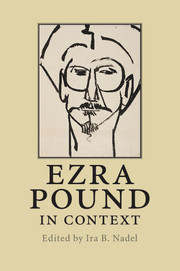Book contents
- Frontmatter
- Contents
- Notes on contributors
- Acknowledgements
- Chronology
- List of abbreviations and note on references to The Cantos
- Introduction
- Part I Biography and works
- 1 Prose criticism
- 2 Poetics
- 3 Translation
- 4 Romance languages
- 5 Letters
- 6 Editor, anthologist
- 7 Education
- 8 Journalism
- 9 Politics
- 10 Economics
- 11 Radio broadcasts
- 12 Law
- 13 Textual criticism
- 14 Archives
- 15 The Lives of Pound
- Part II Historical and cultural context
- Part III Critical reception
- Further reading
- Index
3 - Translation
Published online by Cambridge University Press: 05 July 2014
- Frontmatter
- Contents
- Notes on contributors
- Acknowledgements
- Chronology
- List of abbreviations and note on references to The Cantos
- Introduction
- Part I Biography and works
- 1 Prose criticism
- 2 Poetics
- 3 Translation
- 4 Romance languages
- 5 Letters
- 6 Editor, anthologist
- 7 Education
- 8 Journalism
- 9 Politics
- 10 Economics
- 11 Radio broadcasts
- 12 Law
- 13 Textual criticism
- 14 Archives
- 15 The Lives of Pound
- Part II Historical and cultural context
- Part III Critical reception
- Further reading
- Index
Summary
No less than he did for poetry, Ezra Pound successfully redefined both the conceptual and procedural terms for translation as a mode of literary production during the modernist period and after. Over practically his entire long career, Pound engaged in a sustained and enormously varied effort as both a practitioner and theorist of translation. Stretching at least from the early Sonnets and Ballate of Guido Cavlacanti (1912) all the way to the late collection of Love Poems of Ancient Egypt (1962), Pound published renderings of numerous different works from a wide range of languages, including Greek, Latin, Provençal, and classical Chinese, in addition to medieval Italian and Egyptian. Over and above the sheer volume of these efforts at rendering particular texts, he repeatedly, if never systematically, engaged in critical reflection about the practice, discussing both the larger cultural significance of translation and its proper methods. Taken together, his achievements in the arena of translation comprise a substantial and fundamentally important part of his overall accomplishment as a writer.
Pound's commitment to translation as a distinctive (and distinctively important) mode of literary production arose from a steadily deepening conviction about its generative role in the broader formation of a vital literary culture. As early as 1916, Pound hypothesized that “A great age of literature is perhaps always a great age of translations; or follows it” (LE, 232). Thirteen years later, any lingering doubts he might have harbored about the generative importance of translation in the rise of English literature had completely disappeared. Thus in “How to Read” (1929), his first attempt at a primer for modernism, he summarily declares that, after the period of purely indigenous Anglo-Saxon works such as “The Seafarer” and Beowulf, “English literature lives on translation, it is fed by translation; every new exuberance, every new heave is stimulated by translation, every allegedly great age is an age of translations” (LE, 34–5).
- Type
- Chapter
- Information
- Ezra Pound in Context , pp. 33 - 42Publisher: Cambridge University PressPrint publication year: 2010
- 1
- Cited by



